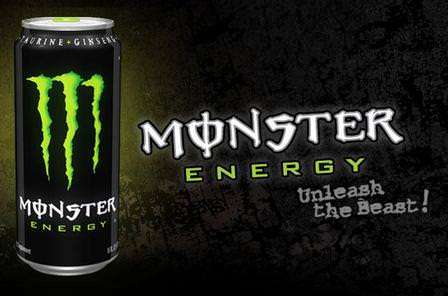NYT Says Energy Drink Is Still a Monster, Even in the Soft Drink Aisle

"For a decade," writes business reporter Barry Meier in today's New York Times, the manufacturer of Monster energy drinks "sold its products as dietary supplements, apparently as part of a strategy to convince consumers that they were different from beverages." As Meier previously has informed us, that strategy was misleading, because, aside from the caffeine they deliver, energy drinks' special ingredients don't seem to do much. Meier also has worried that energy drinks "marketed as supplements do not list the amount of caffeine used." So now that Monster Beverage has decided to sell its products as soft drinks rather than dietary supplements and list caffeine content on every can, you might think Meier would be pleased—but only if you have not been following his series of alarmist stories about energy drinks, which he portrays as a deadly threat foisted on naive consumers by conniving, callous corporations.
In Meier's mind, companies like Monster can do no right. Hence he warns in the second sentence of his story that Monster's switch "will bring significant changes in how it is regulated." For instance, the company "will no longer be required to tell federal regulators about reports potentially linking its products to deaths and injuries." Meier adds that "the company's recent move, which follows a similar regulatory makeover by another brand, Rockstar Energy, comes amid intensifying scrutiny of energy drink safety"—scrutiny prompted largely by his own scaremongering.
To his credit (or perhaps his editor's), Meier notes in his fourth paragraph that "a 16-ounce can of Monster's most popular energy drinks will contain 140 to 160 milligrams of caffeine, compared with about 330 milligrams in a 16-ounce cup of Starbucks coffee." Ounce for ounce, in other words, energy drinks contain less than half as much caffeine as coffee. Yet caffeine is the ingredient that worries Meier, who says it might just kill you. He has never explained why the same stimulant that is so worrisome in energy drinks is no big deal in coffee, which contains a much higher dose of it.
The lawsuit that seems to have triggered Meier's caffeine jitters was filed by the parents of Anais Fournier, a Maryland teenager who died of cardiac arrythmia in December 2011 after drinking two 24-ounce cans of Monster energy drink on two consecutive days. As Monster notes in a recent press release, each of those cans contained about 240 milligrams of caffeine, which is less than a 12-ounce ("tall") cup of Starbucks coffee (about 260 mg) and substantially less than a 16-ounce ("grande") cup (about 330 mg). So if the caffeine in those two energy drinks really did kill Fournier, the same thing could have happened with two cups of coffee, which is hardly a reckless level of consumption and does not come anywhere close to a lethal amount. Meier's colleague C. Claiborne Ray reports that "the estimated fatal oral dose, which varies because of factors like weight, is 5 grams to 10 grams," more than 10 times as much as Fournier reportedly consumed on two occasions a day apart.
Amazingly, although a medical examiner's report on Fournier's death mentions "caffeine toxicity," no blood tests were done to measure how much caffeine was in her system or even to confirm whether it was present at all. Monster's lawyer, Daniel Callahan, says that by the time of her death, which occurred three hours after she drank the second can, whatever caffeine she ingested the previous evening "would have completely dissipated," while "only about 2/3rds of caffeine from the second beverage would have remained." Fournier suffered from Ehlers-Danlos Syndrome, a connective tissue disorder that affects blood vessels and the heart. Callahan adds that Fournier had "multiple heart ailments," including mitral valve prolapse, intramural coronary artery thickening, and myocardial fibrosis. He says medical consultants hired by the beverage maker "stated conclusively that there is no medical, scientific or factual evidence to support the Maryland Medical Examiner's Report of 'caffeine toxicity' or that Ms. Fournier's consumption of two Monster Energy Drinks 24 hours apart contributed to, let alone was the cause of, her untimely death."
That is pretty much what you would expect defense experts to say. But even if the modest amount of caffeine that Fournier consumed contributed to her death because of her pre-existing cardiovascular problems, such an outcome is extremely rare, to say the least. How often do you hear about people dying from caffeine toxicity after drinking a cup of Starbucks coffee? To focus on the danger posed by the substantially lower levels of caffeine in energy drinks, as Meier has done, seems utterly irrational.


Show Comments (61)